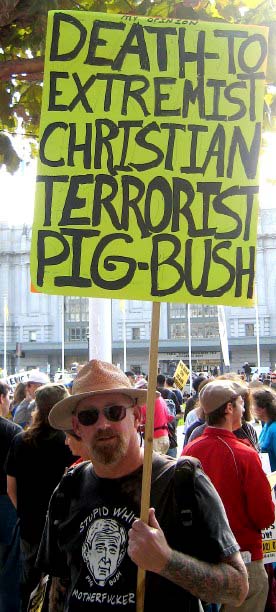Why I Left Liberalism Behind
I grew up in a house where we conserved water, recycled even though it was a pain in the neck in the 1970s, drove small cars and carpooled, tried to buy local and reduce waste. We were a one trash bag a month family.
My parents voted for Obama, enthusiastically so, and voted for every Democrat they could find. They still do. They value human equality, believe government should help the less fortunate, don’t trust religion in politics, and are very skeptical about anything conservative.
After two decades of being a liberal, I reversed course. These reasons are why:
- Liberalism encouraged selfishness. Making the individual our highest goal is not conducive to a society having consensus and shared values. Such a society stops challenging itself and trying to improve, and so stagnates.
- Liberalism encouraged a victim mentality. The constant search for an oppressor, viewing life in this binary of equality/inequality and free/unfree suggests a paranoia by which things happen to us, not us constructing things.
- Liberalism couldn’t make hard decisions. It was great if the question was how to hand out government money or who to politically recognize. But if you had four fire trucks, and five fires, there was no answer — someone immediately raised an objection and debate reached an impasse.
- History alarmed me. From Plato to the French Revolution, to the pre-WWII years and 1968, liberalism brought instability and infighting. It left shadows of former great world powers.
- Liberalism could not critique its own values. It was taken for granted that we were the progressives, and everyone else, while equal, was just ignorant. Once something got added to the dogma, it was not possible to critique it and say maybe we should change direction.
- Racism. Liberal racism takes this form: any group that is wealthy and lives well is, because they are equal like us, merely lucky, and so they owe it to us. Consequently, liberals hate white middle class heterosexual males, and even hate groups perceived to be elite and wealthy like Jews or Catholics.
- Dogma. In liberal circles, being correct politically and socially took precedence over sound engineering solutions, which I’ve come to believe in. I take economics seriously, as I do mathematics, physics, electrical engineering and computer science. The universe works mathematically and consistently. Engineering is a way to understand this and make it work for us. Dogma should not supplant this, but it does among liberal circles.
- False elitism. The self-congratulatory tone of “progressives” alarmed me, because I think elitism should be based on accomplishment, not saying the right thing to a group of the converted and having them clap the loudest.
- A bad record. I participated from the sidelines, for twenty years, in every liberal issue that came my way and toed the party line. After all, the news stories seemed to have facts that supported my view. While this is a topic for another much longer article, let me say this: none of the predictions came to pass, and none of the solutions worked.
- Misery. Finally, but most importantly: my liberal friends and I were quietly miserable. We fought oppression, lived “progressive” lifestyles, and hung out with other liberals, but we found it wasn’t working for us because the liberalism itself made us neurotic, defensive and unlikely to succeed as a result.
The last point really got to me: if our worldview was not making us happy, and was not achieving its goals, what lay in store for us but lives of quiet desperation paired to an increasingly paranoid ideology?
 My fellow liberals are good people. But they are confused because liberalism is a bad mental virus. It is composed of all of the fears of the individual, gathered up and made into a political movement guaranteeing that individual is beyond criticism, which results in social decay through lack of any accord about constructive goals.
My fellow liberals are good people. But they are confused because liberalism is a bad mental virus. It is composed of all of the fears of the individual, gathered up and made into a political movement guaranteeing that individual is beyond criticism, which results in social decay through lack of any accord about constructive goals.
For a long time was I not conservative but in the words of the writer Michel Houellebecq, “anti-liberal.” I read Plato, Nietzsche, Schopenhauer, Pascal, Heidegger and Herodotus. I saw how liberalism was, as Plato pointed out, the stage of decay that turns great nations into third world ones. Or more significantly: that when liberalism arises, a nation is in decline.
For my next stage, I stopped thinking in terms of bureaucratic solutions, or solutions where we all agree what is right, and then form a government or social group to enforce it on others.
I started thinking in terms of granular solutions, and realized that throughout my life, I had encountered people with their heads “roughly” on straight, and then another miscellaneous group of sociopaths, idiots, perverts and opportunists. Each time I did not confront and drive away a sociopath/etc, they did something destructive later and normal healthy people paid for it.
I began to realize that more than political outlook, what matters is the quality of the individual: how morally alert you are, how intelligent you are, how motivated you are to learn and construct, instead of destroy.
And one group opposed that: liberals. Liberalism wants us to be equal and not rise above the herd, or oppress others who are “different,” even if that different is out of place.
Liberalism is defensive, reactionary and biased against life because in nature, for reasons of the mathematics of the universe, nothing is equal. Like tadpoles in a summer pool, some are born to wealth and beauty and power; others are born to squalid ghettoes. Liberalism hates nature and retaliates against it with equality.
I consider equality to be an insult to my friends and family. I pick the people I find to be morally good, intelligent and alert; I’m not going to pretend they’re “equal” to others, because they rise above the herd of mostly confused and lonely people out there. That’s why I love my people.
Even more importantly, liberalism is a focus on outward appearance being more important than function. The primary ideas of liberalism are pacifism, equality and lack of obligation to state, philosophical or ideological ideals (outside of liberalism). This encourages people to avoid conflict, and focus only on themselves, which made my friends neurotic, lonely, single, generally alcoholic train wrecks barely under control.
My belief is now that if we stop looking at liberalism as a political philosophy, and start looking at it as a psychological coping mechanism, we can fix the underlying problems that prompt people toward this self-destructive ideology.
Tags: bureaucracy, crowdism, egalitarianism, leftism, liberalism










